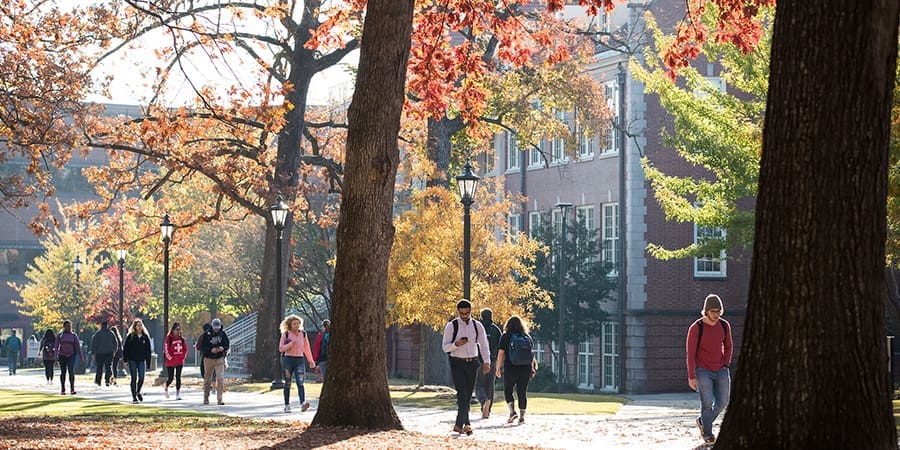The UNC System is a public university system made up of 16 universities and the North Carolina School of Science and Mathematics, the nation’s first public residential high school for gifted students.
For 136 years, the only campus of the University of North Carolina was at Chapel Hill. Chartered in 1789 by the North Carolina General Assembly, UNC-Chapel Hill was the first public university in the United States. By 1877, the General Assembly had begun sponsoring additional institutions of higher education, broadening access for all North Carolinians. Five universities were historically black institutions, and another was founded to serve American Indians. Some opened as high schools. Several were teaching colleges or women’s colleges. Others emphasized technology or agriculture. One was established as a school for performing artists.
Between 1931 and 1969, the System grew from three, to four, to six universities. Then, in 1971, North Carolina’s remaining 10 public senior institutions were brought into the fold to create what we now call the University of North Carolina System.
In addition to its educational mission, the UNC System serves the people of North Carolina through research and public service. It also oversees six affiliate organizations including UNC Health, PBS North Carolina, The University of North Carolina Press, the North Carolina Arboretum, the North Carolina State Education Assistance Authority, and Project Kitty Hawk.

OUR institutions

Appalachian State University
East Carolina University

Elizabeth City State University
Fayetteville State University
North Carolina Agricultural and Technical State University
North Carolina Central University
NC State University

University of North Carolina Asheville
University of North Carolina at Chapel Hill

University of North Carolina at Charlotte

University of North Carolina at Greensboro

University of North Carolina at Pembroke

University of North Carolina School of the Arts

University of North Carolina Wilmington
Western Carolina University

Winston-Salem State University
North Carolina School of Science and Mathematics

OUR STUDENTS
247,927
students were enrolled in UNC System institutions in Fall 2024
83%
are from North Carolina
34%
are Pell Grant recipients
28%
are from rural North Carolina
59.1%
are female
36%
are underrepresented minorities
40.9%
are male

OUR PRIORITIES
The UNC System’s Strategic Plan, Higher Expectations, outlines the goals and metrics that reflect the long-term vision and priorities of the University of North Carolina Board of Governors.

Access

Affordability and Efficiency

Student Success

Excellent and Diverse Institutions

Economic Impact

Community Engagement

OUR MISSION
Education, research, and public service for all North Carolinians.
The University of North Carolina is a public, multi-campus university dedicated to the service of North Carolina and its people. It encompasses the 17 diverse constituent institutions and other educational, research, and public service organizations. Each share in the overall mission of the University. That mission is to discover, create, transmit, and apply knowledge to address the needs of individuals and society. This mission is accomplished through instruction, which communicates the knowledge and imparts the skills necessary for individuals to lead responsible, productive, and personally satisfying lives; through research, scholarship, and creative activities, which advance knowledge and enhance the educational process; and through public service, which contributes to the solution of societal problems and enriches the quality of life in the State. In the fulfillment of this mission, the University shall seek an efficient use of available resources to ensure the highest quality in its service to the citizens of the State.
The University’s mission statement was adopted by the UNC Board of Governors in 1992 and given statutory status in 1995.
Teaching and learning constitute the primary service that the University renders to society. Teaching, or instruction, is the primary responsibility of each of the constituent institutions. The relative importance of research and public service, which enhance teaching and learning, varies among the constituent institutions, depending on their overall missions.

OUR LEADERSHIP
UNC Board of Governors
The UNC System is overseen by the UNC Board of Governors, which, under Chapter 116 of the North Carolina General Statutes, has responsibility for the planning, development, and overall governance of the UNC System. The Board also elects the president of the UNC System.
President
The president is the UNC System’s chief administrative and executive officer, with authority to manage the affairs and execute the policies of the University, subject to the direction of the Board of Governors.
UNC System Office
The UNC System Office, located in Raleigh, houses the offices of the president and other senior administrative officers of the multi-campus UNC System.